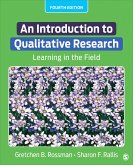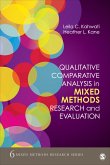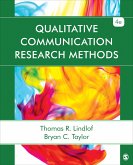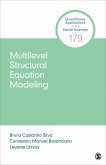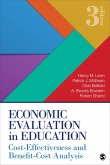Carol R. Bailey
A Guide to Qualitative Field Research
Schade – dieser Artikel ist leider ausverkauft. Sobald wir wissen, ob und wann der Artikel wieder verfügbar ist, informieren wir Sie an dieser Stelle.
Carol R. Bailey
A Guide to Qualitative Field Research
- Broschiertes Buch
- Merkliste
- Auf die Merkliste
- Bewerten Bewerten
- Teilen
- Produkt teilen
- Produkterinnerung
- Produkterinnerung
A Guide to Qualitative Field Research provides readers with clear, practical, and specific instructions for conducting qualitative research in the field. In the expanded Third Edition, Carol A. Bailey gives increased attention to the early and last stages of field research, often the most difficult: selecting a topic, deciding upon the purpose of your research, and writing the final paper, all in her signature reader-friendly writing style.
Andere Kunden interessierten sich auch für
![An Introduction to Qualitative Research An Introduction to Qualitative Research]() Gretchen B RossmanAn Introduction to Qualitative Research121,99 €
Gretchen B RossmanAn Introduction to Qualitative Research121,99 €![Qualitative Comparative Analysis in Mixed Methods Research and Evaluation Qualitative Comparative Analysis in Mixed Methods Research and Evaluation]() Leila KahwatiQualitative Comparative Analysis in Mixed Methods Research and Evaluation79,99 €
Leila KahwatiQualitative Comparative Analysis in Mixed Methods Research and Evaluation79,99 €![Qualitative Communication Research Methods Qualitative Communication Research Methods]() Thomas R. LindlofQualitative Communication Research Methods190,99 €
Thomas R. LindlofQualitative Communication Research Methods190,99 €![The Essential Guide to Doing Your Research Project The Essential Guide to Doing Your Research Project]() Zina O'LearyThe Essential Guide to Doing Your Research Project173,99 €
Zina O'LearyThe Essential Guide to Doing Your Research Project173,99 €![A Primer on Partial Least Squares Structural Equation Modeling (PLS-SEM) A Primer on Partial Least Squares Structural Equation Modeling (PLS-SEM)]() Joe HairA Primer on Partial Least Squares Structural Equation Modeling (PLS-SEM)80,99 €
Joe HairA Primer on Partial Least Squares Structural Equation Modeling (PLS-SEM)80,99 €![Multilevel Structural Equation Modeling Multilevel Structural Equation Modeling]() Bruno Castanho SilvaMultilevel Structural Equation Modeling49,99 €
Bruno Castanho SilvaMultilevel Structural Equation Modeling49,99 €![Economic Evaluation in Education Economic Evaluation in Education]() Henry M. LevinEconomic Evaluation in Education111,99 €
Henry M. LevinEconomic Evaluation in Education111,99 €-
-
A Guide to Qualitative Field Research provides readers with clear, practical, and specific instructions for conducting qualitative research in the field. In the expanded Third Edition, Carol A. Bailey gives increased attention to the early and last stages of field research, often the most difficult: selecting a topic, deciding upon the purpose of your research, and writing the final paper, all in her signature reader-friendly writing style.
Produktdetails
- Produktdetails
- Verlag: SAGE Publications Inc
- 3 Revised edition
- Seitenzahl: 280
- Erscheinungstermin: 5. Dezember 2017
- Englisch
- Abmessung: 231mm x 185mm x 15mm
- Gewicht: 484g
- ISBN-13: 9781506306995
- ISBN-10: 1506306993
- Artikelnr.: 48328958
- Herstellerkennzeichnung
- Libri GmbH
- Europaallee 1
- 36244 Bad Hersfeld
- gpsr@libri.de
- Verlag: SAGE Publications Inc
- 3 Revised edition
- Seitenzahl: 280
- Erscheinungstermin: 5. Dezember 2017
- Englisch
- Abmessung: 231mm x 185mm x 15mm
- Gewicht: 484g
- ISBN-13: 9781506306995
- ISBN-10: 1506306993
- Artikelnr.: 48328958
- Herstellerkennzeichnung
- Libri GmbH
- Europaallee 1
- 36244 Bad Hersfeld
- gpsr@libri.de
Carol A. Bailey is an associate professor emerita of sociology at Virginia Tech. She has won numerous teaching awards at the department and university level, including the Alumni Award for Teaching Excellence and the Wine Award for Excellence in Teaching. She taught undergraduate research methods and graduate-level courses on qualitative methodology and pedagogy. Once the Director of the University Writing Program, her research focused on evaluating programs that promote science education and those that serve children with severe mental illnesses and their families.
List of Tables, Figures, and Photographs
Preface
Acknowledgments
About the Author
Chapter 1. Introduction to Qualitative Field Research
Objectives
Overview
Examples of Field Research
Major Features of Field Research
Putting It All Together
Conclusions
Chapter Highlights
Exercises
Online and Recommended Reading
Chapter 2. Ethics
Objectives
Informed Consent
Deception
Confidentiality
Relationships
Ethics in Virtual Field Research
Conclusions
Chapter Highlights
Exercises
Online and Recommended Reading
Chapter 3. Topic, Purpose, and Research Questions
Objectives
Research Topic
Purpose of Research
Research Questions
Putting It All Together
Conclusions
Chapter Highlights
Exercises
Online and Recommended Reading
Chapter 4. Theory and Review of Literature
Objectives
Concepts
Theory
Review of Literature
Putting It All Together
Conclusions
Chapter Highlights
Exercises
Online and Recommended Reading
Chapter 5. Paradigms, Research Design, and Introduction to Methodology
Objectives
Proposal
Paradigms
Research Design
Methodology
Conclusions
Chapter Highlights
Exercises
Online and Recommended Reading
Chapter 6. From Gaining Entrée to Exiting the Field
Objectives
Gaining Entrée and Gatekeepers
Preparations
Arrival in the Field
Key Actors
Field Relationships
Time in the Field
Leaving the Field
Conclusions
Chapter Highlights
Exercises
Online and Recommended Reading
Chapter 7. Observations
Objectives
Should I Conduct Covert or Overt Observations?
Should I Only Observe or Participate Fully When Observing?
Where Should I Observe?
Should My Observations Be Structured or Unstructured?
What Should I Observe?
Research Questions
Unit of Analysis
Ethics
Conclusions
Chapter Highlights
Exercises
Online and Recommended Reading
Chapter 8. Interviews
Objectives
Types of Interviews
Question Construction
Interview Questions and Research Questions
Location of the Interview
Rapport
Ethics
Status Characteristics
Alternatives to Face-to-Face Interviews
After the Interview
Sampling
Conclusions
Chapter Highlights
Exercises
Online and Recommended Reading
Chapter 9. Field Notes
Objectives
Purposes of Field Notes
Taking Field Notes
Field Note Content
Putting It All Together
Conclusions
Chapter Highlights
Exercises
Online and Recommend Reading
Chapter 10. Procedures for Increasing Validity and Trustworthiness
Objectives
Validity and Trustworthiness
Strategies for Enhancing Validity and Trustworthiness
Conclusions
Chapter Highlights
Exercises
Online and Recommended Reading
Chapter 11. Introduction to Analysis and Coding
Objectives
Analysis
Coding
Practical Aspects of Coding
Coding and Grounded Theory
Computer-Assisted Qualitative Data Analysis Software
Putting It All Together
Conclusions
Chapter Highlights
Exercises
Online and Recommended Reading
Chapter 12. Descriptions and Typologies
Objectives
Descriptions
Typologies
Conclusions
Chapter Highlights
Exercises
Online and Recommended Reading
Chapter 13. Thematic Analysis
Objectives
Purposes of a Thematic Analysis
What Are Themes?
Identifying Versus Emerging Themes
Overarching Themes
Topical Themes
Interpretation
Conclusions
Chapter Highlights
Exercises
Online and Recommended Reading
Chapter 14. Research Stories and Critical Events and Cases
Objectives
Elements in a Research Story
Critical Events and Cases
Conclusions
Chapter Highlights
Exercises
Online and Recommend Reading
Chapter 15. Writing and the Final Paper
Objectives
Writing Process
Writing Styles Used in Final Papers
Format of a Final Paper
Putting It All Together
Conclusions
Chapter Highlights
Exercises
Online and Recommended Reading
References
Glossary
Index
Preface
Acknowledgments
About the Author
Chapter 1. Introduction to Qualitative Field Research
Objectives
Overview
Examples of Field Research
Major Features of Field Research
Putting It All Together
Conclusions
Chapter Highlights
Exercises
Online and Recommended Reading
Chapter 2. Ethics
Objectives
Informed Consent
Deception
Confidentiality
Relationships
Ethics in Virtual Field Research
Conclusions
Chapter Highlights
Exercises
Online and Recommended Reading
Chapter 3. Topic, Purpose, and Research Questions
Objectives
Research Topic
Purpose of Research
Research Questions
Putting It All Together
Conclusions
Chapter Highlights
Exercises
Online and Recommended Reading
Chapter 4. Theory and Review of Literature
Objectives
Concepts
Theory
Review of Literature
Putting It All Together
Conclusions
Chapter Highlights
Exercises
Online and Recommended Reading
Chapter 5. Paradigms, Research Design, and Introduction to Methodology
Objectives
Proposal
Paradigms
Research Design
Methodology
Conclusions
Chapter Highlights
Exercises
Online and Recommended Reading
Chapter 6. From Gaining Entrée to Exiting the Field
Objectives
Gaining Entrée and Gatekeepers
Preparations
Arrival in the Field
Key Actors
Field Relationships
Time in the Field
Leaving the Field
Conclusions
Chapter Highlights
Exercises
Online and Recommended Reading
Chapter 7. Observations
Objectives
Should I Conduct Covert or Overt Observations?
Should I Only Observe or Participate Fully When Observing?
Where Should I Observe?
Should My Observations Be Structured or Unstructured?
What Should I Observe?
Research Questions
Unit of Analysis
Ethics
Conclusions
Chapter Highlights
Exercises
Online and Recommended Reading
Chapter 8. Interviews
Objectives
Types of Interviews
Question Construction
Interview Questions and Research Questions
Location of the Interview
Rapport
Ethics
Status Characteristics
Alternatives to Face-to-Face Interviews
After the Interview
Sampling
Conclusions
Chapter Highlights
Exercises
Online and Recommended Reading
Chapter 9. Field Notes
Objectives
Purposes of Field Notes
Taking Field Notes
Field Note Content
Putting It All Together
Conclusions
Chapter Highlights
Exercises
Online and Recommend Reading
Chapter 10. Procedures for Increasing Validity and Trustworthiness
Objectives
Validity and Trustworthiness
Strategies for Enhancing Validity and Trustworthiness
Conclusions
Chapter Highlights
Exercises
Online and Recommended Reading
Chapter 11. Introduction to Analysis and Coding
Objectives
Analysis
Coding
Practical Aspects of Coding
Coding and Grounded Theory
Computer-Assisted Qualitative Data Analysis Software
Putting It All Together
Conclusions
Chapter Highlights
Exercises
Online and Recommended Reading
Chapter 12. Descriptions and Typologies
Objectives
Descriptions
Typologies
Conclusions
Chapter Highlights
Exercises
Online and Recommended Reading
Chapter 13. Thematic Analysis
Objectives
Purposes of a Thematic Analysis
What Are Themes?
Identifying Versus Emerging Themes
Overarching Themes
Topical Themes
Interpretation
Conclusions
Chapter Highlights
Exercises
Online and Recommended Reading
Chapter 14. Research Stories and Critical Events and Cases
Objectives
Elements in a Research Story
Critical Events and Cases
Conclusions
Chapter Highlights
Exercises
Online and Recommend Reading
Chapter 15. Writing and the Final Paper
Objectives
Writing Process
Writing Styles Used in Final Papers
Format of a Final Paper
Putting It All Together
Conclusions
Chapter Highlights
Exercises
Online and Recommended Reading
References
Glossary
Index
List of Tables, Figures, and Photographs
Preface
Acknowledgments
About the Author
Chapter 1. Introduction to Qualitative Field Research
Objectives
Overview
Examples of Field Research
Major Features of Field Research
Putting It All Together
Conclusions
Chapter Highlights
Exercises
Online and Recommended Reading
Chapter 2. Ethics
Objectives
Informed Consent
Deception
Confidentiality
Relationships
Ethics in Virtual Field Research
Conclusions
Chapter Highlights
Exercises
Online and Recommended Reading
Chapter 3. Topic, Purpose, and Research Questions
Objectives
Research Topic
Purpose of Research
Research Questions
Putting It All Together
Conclusions
Chapter Highlights
Exercises
Online and Recommended Reading
Chapter 4. Theory and Review of Literature
Objectives
Concepts
Theory
Review of Literature
Putting It All Together
Conclusions
Chapter Highlights
Exercises
Online and Recommended Reading
Chapter 5. Paradigms, Research Design, and Introduction to Methodology
Objectives
Proposal
Paradigms
Research Design
Methodology
Conclusions
Chapter Highlights
Exercises
Online and Recommended Reading
Chapter 6. From Gaining Entrée to Exiting the Field
Objectives
Gaining Entrée and Gatekeepers
Preparations
Arrival in the Field
Key Actors
Field Relationships
Time in the Field
Leaving the Field
Conclusions
Chapter Highlights
Exercises
Online and Recommended Reading
Chapter 7. Observations
Objectives
Should I Conduct Covert or Overt Observations?
Should I Only Observe or Participate Fully When Observing?
Where Should I Observe?
Should My Observations Be Structured or Unstructured?
What Should I Observe?
Research Questions
Unit of Analysis
Ethics
Conclusions
Chapter Highlights
Exercises
Online and Recommended Reading
Chapter 8. Interviews
Objectives
Types of Interviews
Question Construction
Interview Questions and Research Questions
Location of the Interview
Rapport
Ethics
Status Characteristics
Alternatives to Face-to-Face Interviews
After the Interview
Sampling
Conclusions
Chapter Highlights
Exercises
Online and Recommended Reading
Chapter 9. Field Notes
Objectives
Purposes of Field Notes
Taking Field Notes
Field Note Content
Putting It All Together
Conclusions
Chapter Highlights
Exercises
Online and Recommend Reading
Chapter 10. Procedures for Increasing Validity and Trustworthiness
Objectives
Validity and Trustworthiness
Strategies for Enhancing Validity and Trustworthiness
Conclusions
Chapter Highlights
Exercises
Online and Recommended Reading
Chapter 11. Introduction to Analysis and Coding
Objectives
Analysis
Coding
Practical Aspects of Coding
Coding and Grounded Theory
Computer-Assisted Qualitative Data Analysis Software
Putting It All Together
Conclusions
Chapter Highlights
Exercises
Online and Recommended Reading
Chapter 12. Descriptions and Typologies
Objectives
Descriptions
Typologies
Conclusions
Chapter Highlights
Exercises
Online and Recommended Reading
Chapter 13. Thematic Analysis
Objectives
Purposes of a Thematic Analysis
What Are Themes?
Identifying Versus Emerging Themes
Overarching Themes
Topical Themes
Interpretation
Conclusions
Chapter Highlights
Exercises
Online and Recommended Reading
Chapter 14. Research Stories and Critical Events and Cases
Objectives
Elements in a Research Story
Critical Events and Cases
Conclusions
Chapter Highlights
Exercises
Online and Recommend Reading
Chapter 15. Writing and the Final Paper
Objectives
Writing Process
Writing Styles Used in Final Papers
Format of a Final Paper
Putting It All Together
Conclusions
Chapter Highlights
Exercises
Online and Recommended Reading
References
Glossary
Index
Preface
Acknowledgments
About the Author
Chapter 1. Introduction to Qualitative Field Research
Objectives
Overview
Examples of Field Research
Major Features of Field Research
Putting It All Together
Conclusions
Chapter Highlights
Exercises
Online and Recommended Reading
Chapter 2. Ethics
Objectives
Informed Consent
Deception
Confidentiality
Relationships
Ethics in Virtual Field Research
Conclusions
Chapter Highlights
Exercises
Online and Recommended Reading
Chapter 3. Topic, Purpose, and Research Questions
Objectives
Research Topic
Purpose of Research
Research Questions
Putting It All Together
Conclusions
Chapter Highlights
Exercises
Online and Recommended Reading
Chapter 4. Theory and Review of Literature
Objectives
Concepts
Theory
Review of Literature
Putting It All Together
Conclusions
Chapter Highlights
Exercises
Online and Recommended Reading
Chapter 5. Paradigms, Research Design, and Introduction to Methodology
Objectives
Proposal
Paradigms
Research Design
Methodology
Conclusions
Chapter Highlights
Exercises
Online and Recommended Reading
Chapter 6. From Gaining Entrée to Exiting the Field
Objectives
Gaining Entrée and Gatekeepers
Preparations
Arrival in the Field
Key Actors
Field Relationships
Time in the Field
Leaving the Field
Conclusions
Chapter Highlights
Exercises
Online and Recommended Reading
Chapter 7. Observations
Objectives
Should I Conduct Covert or Overt Observations?
Should I Only Observe or Participate Fully When Observing?
Where Should I Observe?
Should My Observations Be Structured or Unstructured?
What Should I Observe?
Research Questions
Unit of Analysis
Ethics
Conclusions
Chapter Highlights
Exercises
Online and Recommended Reading
Chapter 8. Interviews
Objectives
Types of Interviews
Question Construction
Interview Questions and Research Questions
Location of the Interview
Rapport
Ethics
Status Characteristics
Alternatives to Face-to-Face Interviews
After the Interview
Sampling
Conclusions
Chapter Highlights
Exercises
Online and Recommended Reading
Chapter 9. Field Notes
Objectives
Purposes of Field Notes
Taking Field Notes
Field Note Content
Putting It All Together
Conclusions
Chapter Highlights
Exercises
Online and Recommend Reading
Chapter 10. Procedures for Increasing Validity and Trustworthiness
Objectives
Validity and Trustworthiness
Strategies for Enhancing Validity and Trustworthiness
Conclusions
Chapter Highlights
Exercises
Online and Recommended Reading
Chapter 11. Introduction to Analysis and Coding
Objectives
Analysis
Coding
Practical Aspects of Coding
Coding and Grounded Theory
Computer-Assisted Qualitative Data Analysis Software
Putting It All Together
Conclusions
Chapter Highlights
Exercises
Online and Recommended Reading
Chapter 12. Descriptions and Typologies
Objectives
Descriptions
Typologies
Conclusions
Chapter Highlights
Exercises
Online and Recommended Reading
Chapter 13. Thematic Analysis
Objectives
Purposes of a Thematic Analysis
What Are Themes?
Identifying Versus Emerging Themes
Overarching Themes
Topical Themes
Interpretation
Conclusions
Chapter Highlights
Exercises
Online and Recommended Reading
Chapter 14. Research Stories and Critical Events and Cases
Objectives
Elements in a Research Story
Critical Events and Cases
Conclusions
Chapter Highlights
Exercises
Online and Recommend Reading
Chapter 15. Writing and the Final Paper
Objectives
Writing Process
Writing Styles Used in Final Papers
Format of a Final Paper
Putting It All Together
Conclusions
Chapter Highlights
Exercises
Online and Recommended Reading
References
Glossary
Index


